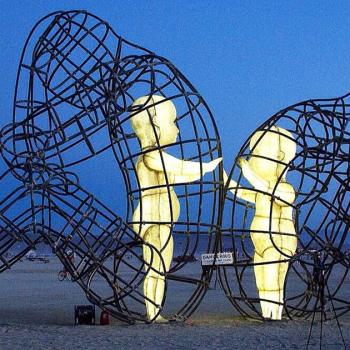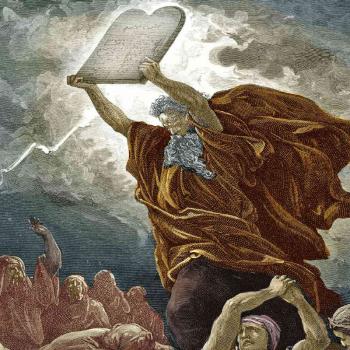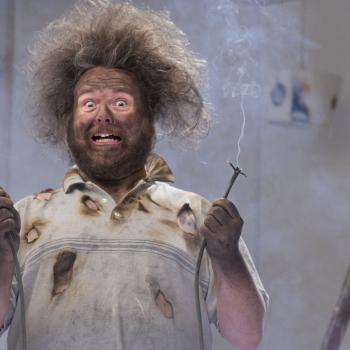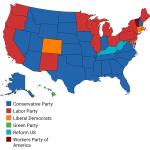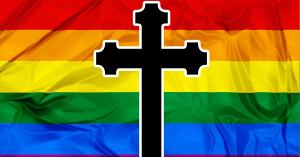
In recent months, I’ve noticed that an increasing number of folk in the Evangelical community are willing to discuss universal salvation and even Biblical inerrancy, but at the first mention of including the LGBTQ+ community, the door gets slammed shut. Dialogue ends there and then. I used to write in the Evangelical channel for Patheos, and the same thing happened there. When writing about the false doctrine of Hell, all manner of conservative voices engaged with me, but once I’d published an article on inclusion, many readers stopped leaving comments. It felt like a brick wall, and if I’m totally honest, I come across some of the same reluctance to include in the Progressive community too.
I’ve reached the conclusion that this is a knee-jerk, fear-driven reaction. Many believers are scared to entertain the idea of inclusion, but why?
Misconceptions about the LGBTQ+ community
Picture with me all the good things about church, or at least that good pastors aspire their churches to be like – a safe space for families, couples, and single people to build a community, share values, support each other, and practice their faith together.
The people within that community might have some scary ideas about the LGBTQ+ community, perhaps through televised glimpses of the extreme fringes of pride parades, which to be fair, can be pretty intimidating. Along with all the colour and joy on display are expressions of sexual permissiveness that, to be frank, most believers won’t be okay with – expressions of lewdness and lasciviousness that we wouldn’t want to see in church.
Part of the problem is that the gay community is known to be a hook-up culture, and it can be easy to assume that by including that community in church, we are giving tacit approval for sexual behaviour that is harmful.
These perceptions result in a huge gulf between church communities and the LGBTQ+ community, because churches fear that by inviting the LGBTQ+ community in, they are welcoming all of its excesses too.
The same values should apply to all, whether gay or straight
Naturally, this is a misconception. There are excesses in the gay community just as there are among straight people. If a heterosexual friend of mine was having an affair with a married woman, I’d certainly have something to say about it. I wouldn’t be harsh or judgemental, but for their own sake I’d want to talk about what’s happening with them and why they’ve ventured into harm. If someone was getting into orgies, and if I had the kind of relationship with them where saying something would make a difference, I’d appeal to them with compassion, because sex and love should always accompany each other and should never be separated. All kinds of harm are inflicted by casual sex, as I explored in a previous article.
Of all my gay and lesbian friends, most are in loving, covenantal relationships. Some are flamboyant and camp, but so what? A splash of colour brightens what can be a grim world at times. Some are involved in hook-up culture, but I love them just like I love anyone else – fully accepting who they are and being there for them when things fall apart.
The truth is, LGBTQ+ folk coming to church are most likely looking for a place to practice or explore their faith rather than a place to practice or explore sexuality. If someone’s lifestyle is destructive, whether heterosexual or gay, we don’t withdraw our affection, but we don’t have to put them in positions of leadership either. In short, I’m saying that a gay person should be just as welcome, just as accepted, and just as responsible as anyone else in a church community. There’s no need to draw a dividing line and treat people differently because of their sexuality.
It’s right for the church to have standards
Every church should have a basic set of standards, based on the Biblical principles of love. 1 Corinthians 13:4-8,
Love is patient, love is kind. It does not envy, it does not boast, it is not proud. It does not dishonour others, it is not self-seeking, it is not easily angered, it keeps no record of wrongs. Love does not delight in evil but rejoices with the truth. It always protects, always trusts, always hopes, always perseveres.
Love never fails.
Galatians 5:22-23,
But the fruit of the Spirit is love, joy, peace, forbearance, kindness, goodness, faithfulness, gentleness and self-control.
A pastor’s job is to shepherd their congregation, encouraging them to embody these values, which are agnostic of sexuality. If someone is harming themselves or others in the congregation, that is to be lovingly addressed. If they continue to inflict harm, despite being offered support, it’s okay to kick them out. But let’s be clear, being gay is neither moral nor immoral – it’s a matter of fundamental identity.
This isn’t about lifestyle, as lifestyle is something a person chooses. Gay people don’t choose to be gay, therefore it is not a lifestyle; it is a fundamental aspect of who they are. I realise that the trans issue blurs the line, as there might be aspects of choice in that, but putting trans identity aside for a moment (to be addressed another day), no gay person I know chose to be the way they fundamentally are. It is a core aspect of their nature and ought to be fully accepted without condition.
If a believer refuses to accept a person for something that is not in and of itself immoral (i.e. unloving), and which is an essential aspect of their identity, they are, quite simply, being a bully. I know some really nice folk who, because of their fear about inclusion, are bullies to the LGBTQ+ community. Claiming you ‘love’ someone while in your heart, refusing to accept who they fundamentally are, is an act of exclusion. It is pain on a stick, made worse by the false appearance of acceptance.
The church should have standards, but each of those should boil down to Biblical principles of love rather than matters of core identity. Too often, we end up fighting all the wrong battles and are distracted from the heart of our mission, which is to love – God, others, and ourselves.
Yes, we need to guard against harm in our communities. We should resist the urge to be judgemental, to be harsh, unforgiving, graceless, and cruel. We should avoid creating factions and envy, we should be honest and trustworthy, we should say no to boasting and pride, and treat everyone with dignity and respect. We should cleave to love, joy, peace, forbearance, kindness, goodness, faithfulness, gentleness and self-control. We should acknowledge that a person in the LGBTQ+ community can do all of this, just as a straight person can; that they can be Christ-like and loving, and therefore experience the Kingdom of God in their daily lives. We should erase the false dividing line between Christian communities and the LGBTQ+ community and work together for the good of all.
Note from the author: The time I spend thinking about, praying about, and writing these articles is time that can’t be spent on work. I’m okay with that, but readers who value my ‘voice’ and want to help me continue to do this can make a pledge or one-off gift through my Patreon page.








